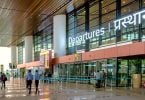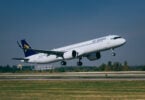LUTON, England – The Brazilian Civil Aviation Authority has authorised its carriers to operate nearly 2,000 additional flights during the World Cup this summer, but, according to OAG, the world’s leading aviation intelligence expert, Brazil’s carriers have not yet increased capacity in June and July to accommodate the influx of football fans and additional traffic that the World Cup will bring.
John Grant, executive vice-president, OAG, says: “Our analytics show that Brazil’s domestic seat capacity is currently down 0.5% and 3% in June and July 2014 respectively, compared to the same months last year. While this is consistent with Brazil’s trend to cut capacity, 0.6m overseas visitors are reported to be travelling to the games, including 22,000 England fans.
“With the group stages of the World Cup spread between 12 cities across the country, fans will need to travel huge distances to attend the group stage matches and air travel, in most cases, is the only realistic option – Rio to Manaus, where England will play their first match, is a drive of 1,768 miles. There are currently just less than 27,000 scheduled aircraft seats in March 2014 between the two cities, making it hard to believe that additional air capacity will not be needed in June.”
According to OAG, Brazil has a well-developed domestic air network, the fourth largest in the world after the USA, China and Japan, including the world’s second largest domestic low-cost carrier network. In March 2014, there will be 10.5m domestic seats available in Brazil. However, Brazil’s domestic market has recently been softening as the economy has slowed. As a consequence, carriers have reigned in capacity. Just 12 months ago, in March 2013, seat capacity was 11% higher than March 2014, at 11.8m seats.
Each of the 12 World Cup cities will host between four and seven matches, with a total of 64 matches to be played. Given an average venue capacity of just under 50,000 seats, this means that around 3.2m people could watch the matches live. Latest estimates for the number of tickets on sale for the World Cup are approximately 3.3m, and estimates for the number of foreign visitors are around 600,000 (www.centreforaviation.com). OAG reports that most of these people will want to fly within Brazil and all the associated movement of teams, sponsors, media and football dignitaries will add a potentially vast number of passengers to the system in June and July 2014.
Grant continues: “Given the country’s good availability of low-cost carriers, fans might be expecting competitive fares, however with demand outstripping supply of airline seats, this may not happen. It has been reported that TAM, one of Brazil’s biggest operators, may charge as much as 2,600 reais (£643) per one-way ticket during the tournament.”
OAG’s analysis of Brazil’s domestic air market ahead of the 2014 FIFA World Cup Brazil is outlined in OAG’s FACTS (Frequency and Capacity Trend Statistics) report for March 2014. The report also analyses seats between the 12 host cities.
(eTN): OAG: No sign of extra airline capacity for fans at 2014 FIFA World Cup | re-post license | post content





















